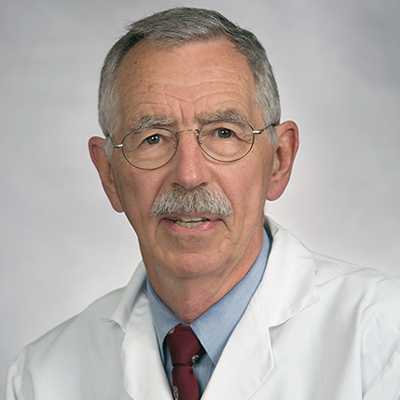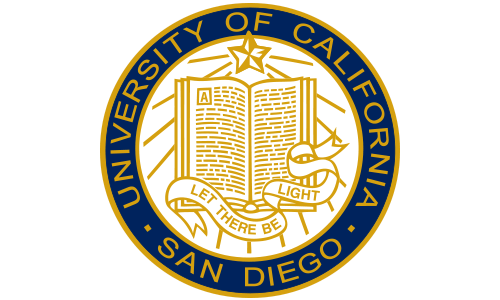Can we stop tumors from learning how to evade therapy?
While many tumors respond well to initial drug therapy, the majority of them eventually become resistant and start growing again despite continued treatment. Dr. Stephen Howell and his team at the Moores UCSD Cancer Center are applying extraordinarily powerful new molecular and genomic techniques to determine how tumor cells learn to become resistant to drugs. The focus is on what changes occur in the DNA of the tumor cells that render them resistant and the evolution of different clones of malignant cells within the tumor.
Dr. Howell is also using genomic information derived from tumors to develop novel drugs that disable the defense mechanisms that tumor cells use during attack by cancer drugs or the immune system. As part of this effort, he is developing new ways to increase the amount of cancer drugs that actually reach tumors with the goal of overwhelming their resistance mechanisms. This involves producing protein therapeutics capable of attaching themselves to the surface of tumor cells while at the same time avoiding normal cells in the body.
Current projects include:
-
Identify resistance genes: The Howell lab is carrying out genomic sequencing of drug resistant tumors to identify all of the mutations that have occurred in the DNA during the development of resistance. The team then uses cell biological techniques to assess which ones are really responsible for the failure of cancer drugs to kill these resistant tumor cells.
-
Synthesis and test new drugs: The Howell lab is focusing primarily on the treatment of ovarian cancer. We need better cancer drugs for this disease, and the team’s approach to is to develop proteins, polymers and nanoparticles that home to ovarian tumor cells and deliver drugs capable of disabling the cellular machinery that the tumor needs to survive.
- Clinical trials: Dr. Howell is running clinical trials of new drugs that are open to patients with ovarian cancer, prostate cancer and acute myelogenous leukemia, all of which are exploring novel concepts aimed at substantially improving therapy for these diseases.
Bio
Dr. Howell is a graduate of Harvard Medical School and was trained as a medical oncologist and pharmacologist at the Massachusetts General Hospital, the National Institutes of Health and the Dana Farber Cancer Institute. Dr. Howell serves as the co-leader of the Solid Tumor Therapeutics Program at the Moores UCSD Cancer Center where he is also Associate Director for Research Education and Training. He is also the Director of the NIH T32 grant-supported Cancer Therapeutics Training (CT2) Program in which eight fellows are currently enrolled, and is the Director of the Clayton Foundation Drug Resistance Laboratory. He attends on the Oncology Service at the Thornton Hospital; his primary clinical interest is in the biology and treatment of ovarian cancer for which he is known nationally and internationally. Over a period of 37 years Dr. Howell has trained 59 postdoctoral fellows, 11 graduate students pursuing a Ph.D, and two graduate students pursuing an M.S. degree. Dr. Howell conducted much of the early pharmacokinetic information and clinical trials work on intraperitoneal chemotherapy for the treatment of ovarian cancer, and his laboratory has contributed importantly to the current understanding of how the platinum-containing drugs enter, traffic through, and exit from ovarian cancer cells, and how such cells become resistant to these drugs. Current work in this area is focused on the use of the CRISPR-cas9 gene editing technology to determine how the copper transporters regulate the cellular pharmacology of the platinum-containing drugs. In addition, the Howell laboratory is actively involved in the development of a panel of novel protein-based therapeutics that target ovarian cancer, and nanoparticle-based drug delivery systems. Dr. Howell is running clinical trials of novel therapeutic approaches in ovarian and prostate cancer, and in acute myelogenous leukemia.
Dr. Howell has published more than 348 articles in peer-reviewed journal and more than 64 book chapters and invited papers, and was elected to the American Society of Clinical Investigation early in his career. He is also the recipient of the Milken Family Medical Foundation Award for Outstanding Work in the Field of Cancer Research, and an Honorary Doctor of Medicine degree from the University of Goteborg, Goteborg, Sweden, for his contributions to the development of novel drug delivery systems for the treatment of cancer. He also received a Presidential Citation from the American Head and Neck Society for his work on intra-arterial drug delivery systems.
Dr. Howell has always liked to figure out how things work. His father was a cloud physicist who developed the field of cloud seeding, and curiosity about how ice crystals form in clouds led to flight training in both power aircraft and gliders at an early age. Growing up in New England, skiing in New Hampshire and Vermont, sailing along the coast from Connecticut to Maine, and working for the Appalachian Mountain Club solidified a love of the outdoors that has expanded during his years in San Diego to include guiding white water rafting trips throughout the West, skiing and hiking the Sierras, Rockies and Alps, and sailing throughout the world. His wife Julianne R. Howell, Ph.D. is a graduate of the Kennedy School of Government at Harvard and has had a career in public policy in healthcare serving as Director of Health Sciences Planning for UCSD, as a Staff Member in the Senate, at the Center for Medicare Administration and now as a senior advisor to the Director of the San Diego County Health and Human Services Program.
For more information, visit http://moores.ucsd.edu/howelllab/
Publications
Awards
American Society of Clinical Investigation, 1984
In recognition of outstanding research in medicine
Milken Family Medical Foundation Award, 1989
For outstanding contributions to the treatment of ovarian cancer
Honorary Doctor of Medicine degree, 1992
Received from the University of Goteborg, Goteborg, Sweden, for his contributions to the development of novel drug delivery systems for the treatment of cancer
Presidential Citation, 1999
From the American Head and Neck Society for his work on intra-arterial drug delivery systems


